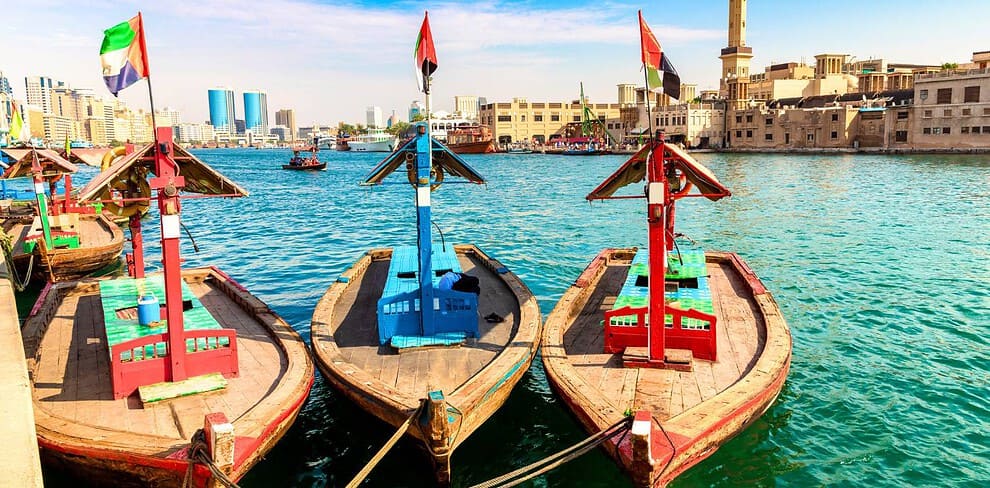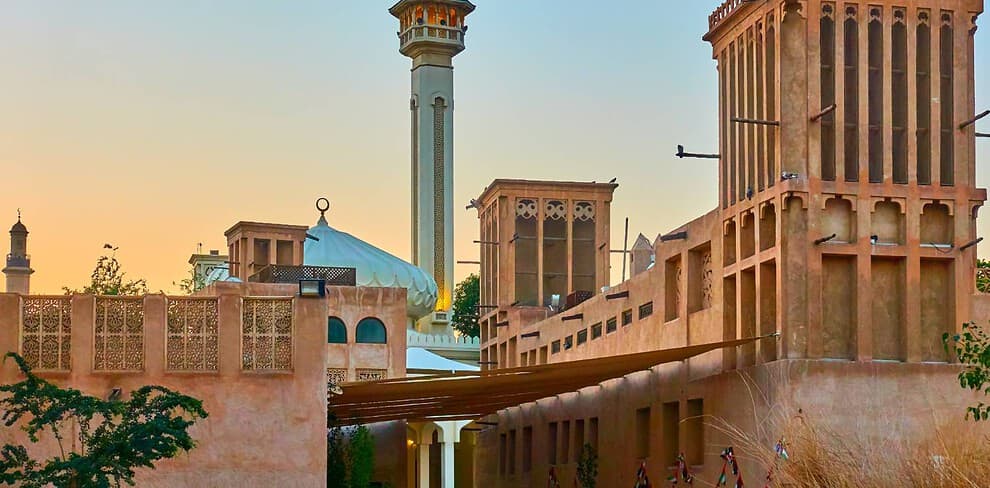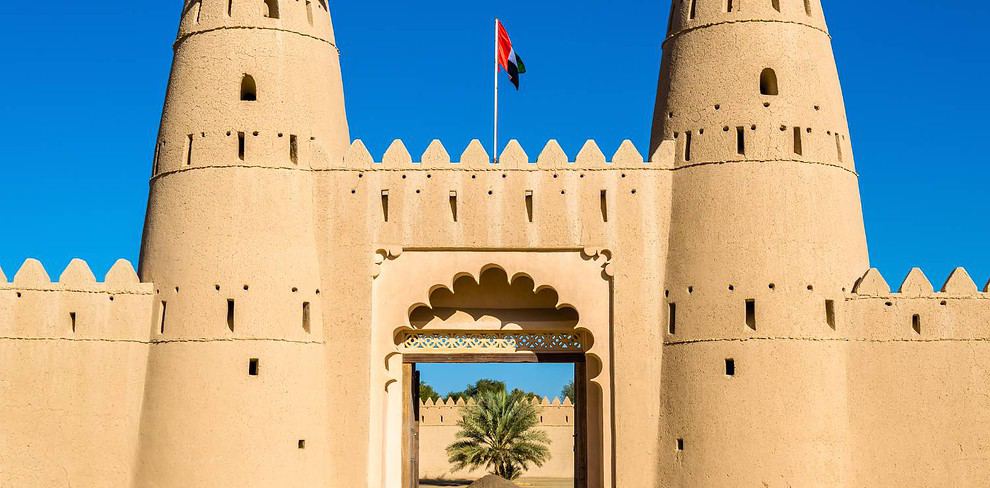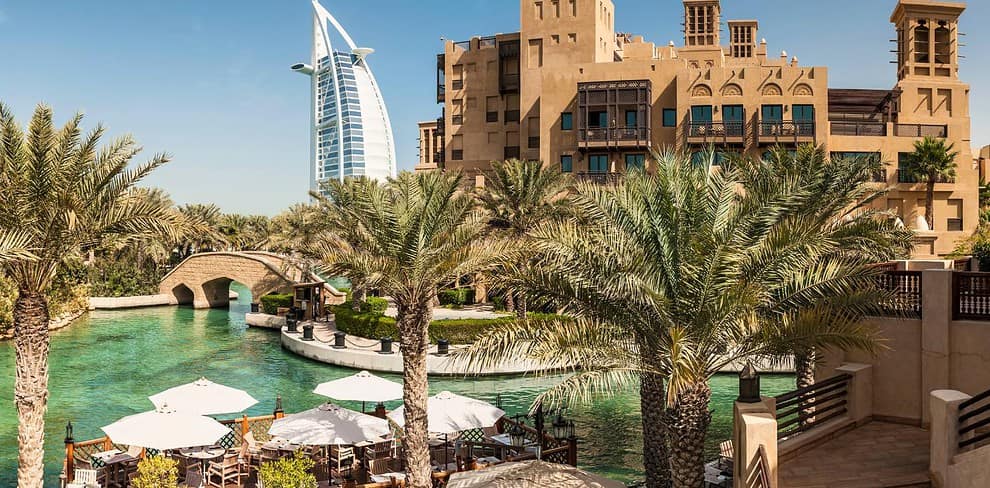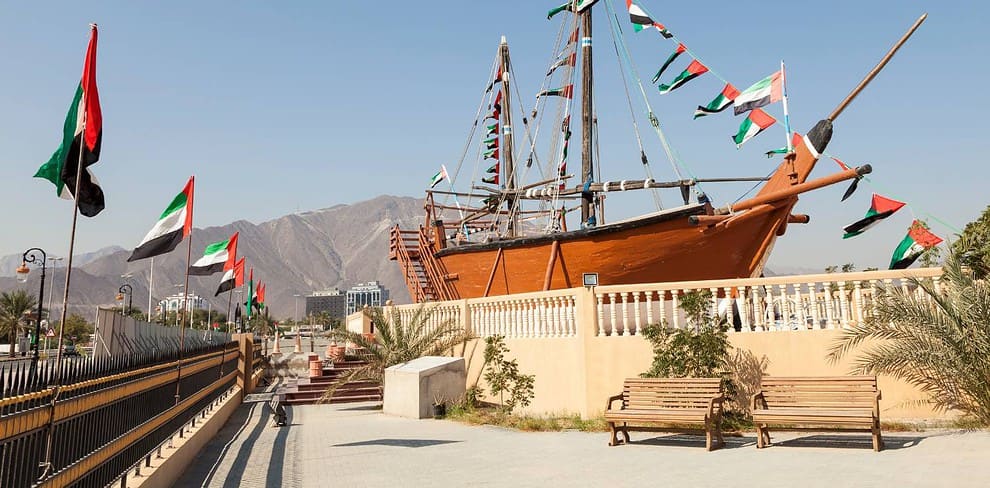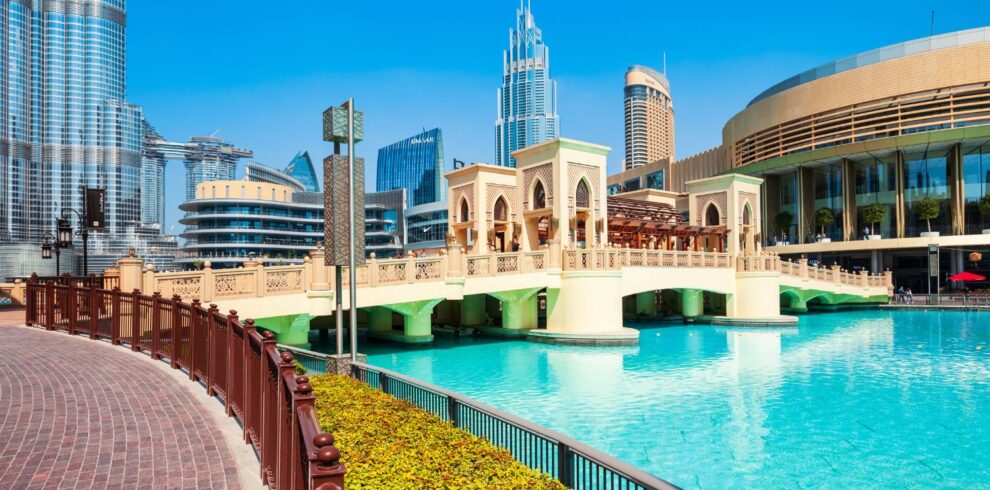Table of Contents
Immerse yourself in United Arab Emirates Culture as we offer you a comprehensive understanding of its customs, reflecting the rich and diverse heritage that encompasses traditions, values, and unique practices.
Emiratis hold hospitality in high regard, warmly welcoming guests with open hearts. Family stands as the cornerstone of Emirati society, fostering strong bonds and a sense of community. It’s essential to acknowledge that United Arab Emirates culture is continually evolving, shaped by historical events, regional influences, and global interactions.
Exploring the culture of the United Arab Emirates can provide valuable insights into the intricate and multifaceted society of the nation.
United Arab Emirates Culture
Here are the most important points to begin learning about United Arab Emirates culture and customs:
- Ethnic Diversity: The United Arab Emirates is a diverse nation with a mix of ethnic groups, each contributing its own customs and traditions. Emiratis, expatriate Arabs, South Asians, and various other communities make up the cultural tapestry.
- Languages: Arabic is the official language of the UAE, but due to its multicultural population, English is also widely spoken and used for business and communication. Other languages and dialects from expatriate communities are prevalent.
- Islamic Practices: The UAE is predominantly a Muslim country, and Islam plays a significant role in United Arab Emirates culture, influencing daily life, values, and societal norms. This includes observing daily prayers, fasting during Ramadan, and adherence to Islamic principles. Sunni Islam is the most widely practiced sect.
- Greeting Etiquette: Greetings are important in United Arab Emirates culture. Handshakes are common among men, while men and women generally do not shake hands. Instead, they exchange verbal greetings and polite phrases.
- Traditional Clothing: Traditional Emirati clothing includes the “kandura” for men and the “abaya” for women. These garments may vary in style and design but are integral to Emirati identity.
- Cuisine: Emirati cuisine includes dishes like “al harees,” “mandi,” and “shawarma,” influenced by Middle Eastern, South Asian, and international flavors. Dates and Arabic coffee are traditional staples.
- Hospitality: Emiratis are known for their warm hospitality. Guests are often offered Arabic coffee and dates upon arrival, and it is customary to accept such offerings as a sign of politeness.
- Respect for Elders: Respect for elders is deeply ingrained in United Arab Emirates culture, with younger individuals showing deference to their seniors through words and actions.
- Arts and Crafts: The UAE has a growing tradition of arts and crafts, including calligraphy, henna art, and pottery. Traditional crafts are celebrated and preserved.
- Music and Dance: Traditional Emirati music involves instruments like the “oud” and “tabla.” Folk dances like the “al-ayyala” are performed during cultural events and celebrations.
- Celebration of Festivals: Emiratis celebrate various religious and cultural festivals, including Eid al-Fitr, Eid al-Adha, and National Day. These occasions often involve special prayers, feasts, and family gatherings.
- Family and Community: Family is highly valued in Emirati society, and strong community bonds are important for support and social cohesion.
- Gender Roles: Traditional gender roles exist, with men and women often having distinct social roles. However, there is an ongoing shift, especially in urban areas, towards greater gender equality.
- Marriage and Relationships: Emirati customs surrounding marriage may involve arranged marriages with family involvement. Marriage is considered a union between families as well as individuals.
- Modern Development: The UAE has experienced rapid modernization and development in recent decades, combining traditional values with a forward-looking approach.
These customs are integral aspects of United Arab Emirates culture and are observable in daily life, reflecting the nation’s rich cultural heritage, diverse population, and a blend of tradition and progress.
United Arab Emirates Traditional Attire
United Arab Emirates Traditional Attire reflects the nation’s cultural heritage, regional distinctions, and historical influences. Emirati clothing not only serves practical purposes but also carries deep cultural and social significance.
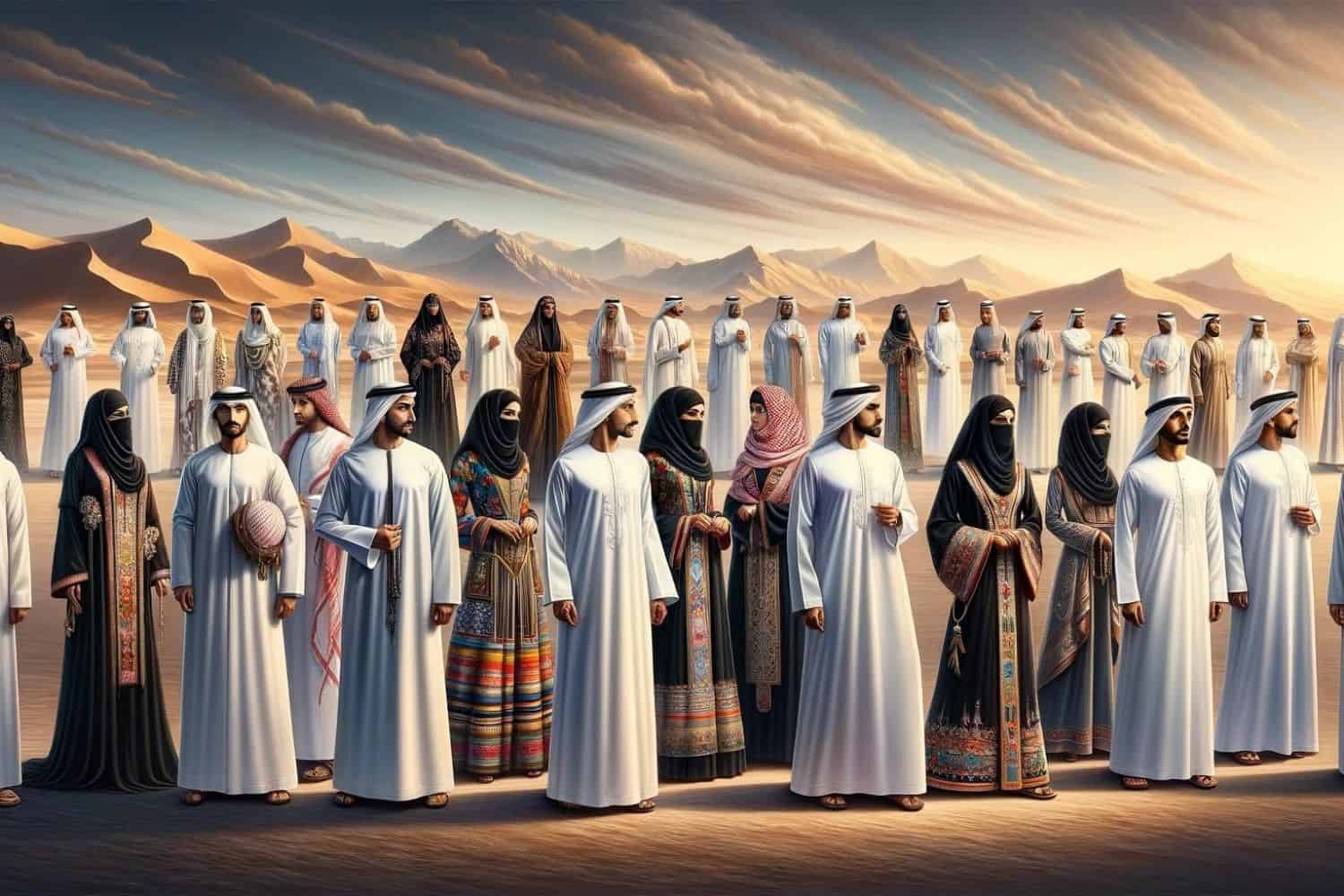
1. Regional Diversity: Traditional clothing in the UAE varies across different regions due to climate, lifestyle, and cultural influences. Coastal areas may have different attire from desert regions.
2. Emirati Men’s Dress: Emirati men typically wear the “kandura” or “dishdasha,” a long, white robe made from lightweight fabric that provides comfort in the desert heat. It is often paired with a white head covering called a “ghutra” or “kufiyya” held in place with an “agal.”
3. Emirati Women’s Dress: Emirati women commonly wear the “abaya,” a flowing, black cloak that covers their clothing. It is often paired with a headscarf or “sheyla.” The abaya and sheyla come in various designs and may feature intricate embroidery or embellishments.
4. Traditional Accessories: Both men and women in the UAE may wear traditional accessories, such as “al sadu” belts, which are handwoven belts often used to cinch the waist of the abaya. Women may also wear jewelry like “kohl” bracelets and “agrab” (hairpins).
5. Special Occasion Attire: Emiratis dress elaborately for special occasions, including weddings and religious celebrations. Traditional attire for such events may include intricately designed clothing, embellished with gold embroidery and jewelry.
6. Adaptation to Modernity: In urban areas of the UAE, Western clothing has become more common in daily life, particularly among the younger generation. However, traditional attire remains important for formal occasions and cultural events.
7. Cultural Preservation: The UAE places a strong emphasis on preserving its cultural heritage, and traditional clothing is a visible symbol of this effort. The government encourages the wearing of traditional attire, especially on national occasions.
8. Modesty and Cultural Values: Traditional Emirati attire emphasizes modesty and cultural values, covering the body in a dignified manner. The choice of fabric, color, and design often signifies social or regional affiliations.
United Arab Emirates traditional attire represents a fusion of practicality, cultural significance, and a connection to the nation’s history. It serves as a visible reminder of the UAE’s rich cultural diversity and heritage.
United Arab Emirates Marriage Traditions
United Arab Emirates Marriage Traditions are deeply influenced by the nation’s Islamic culture and the importance of family and community. These traditions vary across different emirates and may also be influenced by individual preferences.
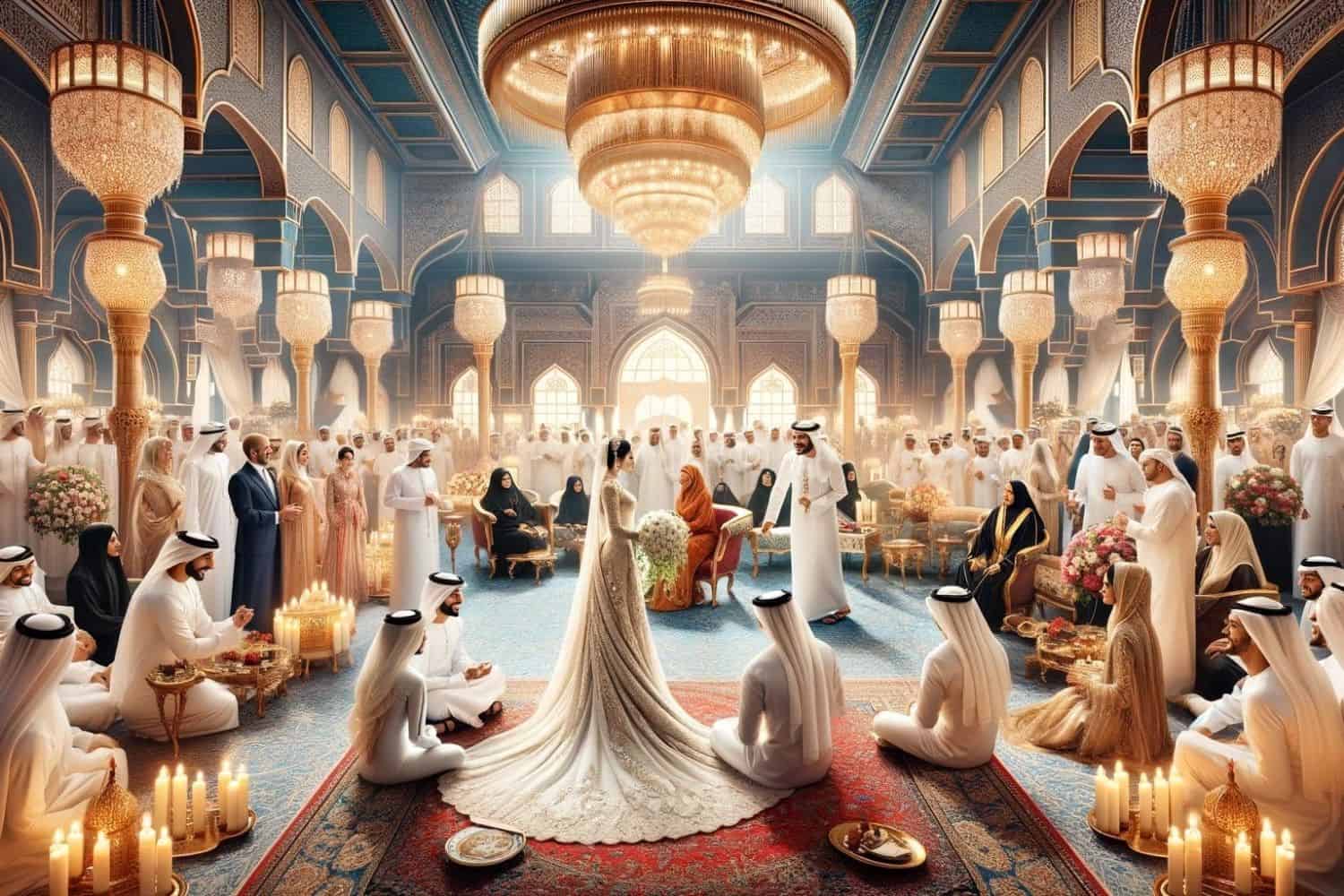
1. Arranged Marriages: Arranged marriages are still prevalent in the UAE, with families playing a key role in matchmaking. Parents and extended family members often help select suitable partners based on compatibility, social status, and family background.
2. Matchmakers: Matchmakers, known as “khatibs” or “marriage brokers,” may assist in finding suitable matches. They act as intermediaries, considering factors like religion, ethnicity, and social compatibility.
3. Engagement: Once a suitable match is found, an engagement ceremony takes place, known as “khutubah” or “mangni.” During this event, the couple and their families formally agree to the marriage.
4. Wedding Celebrations: Emirati weddings are grand and festive affairs. They typically span several days and include various traditional rituals, feasting, music, and dancing. The main ceremony involves the signing of the marriage contract, which is conducted by an Islamic cleric.
5. Bridal Attire: Emirati brides often wear traditional white wedding dresses called “jalabiya” or “thobe.” The groom typically wears a “kandura” or “dishdasha” for the wedding. Both bride and groom may also wear elaborate traditional attire for specific parts of the celebration.
6. Dowry (Mahr): The groom traditionally provides a dowry, known as “mahr,” to the bride as a symbol of commitment and financial security. The mahr can include money, jewelry, or other valuable gifts.
7. Post-Wedding Customs: After the wedding, various customs may continue, such as the “waleemah,” a celebratory feast hosted by the groom’s family. Additionally, the couple may visit relatives and receive blessings.
8. Religious Significance: Marriage in the UAE is considered a sacred contract in Islam. The marriage ceremony is conducted according to Islamic traditions, and Quranic verses may be recited during the proceedings.
9. Community Involvement: Emirati weddings are community events, with extended families and friends playing vital roles in supporting and participating in the celebrations. Hospitality is a key aspect of these events.
10. Modern Trends: While arranged marriages are still common, there is a growing trend of “love marriages,” where individuals choose their partners based on personal preferences. These unions often incorporate both traditional customs and modern elements.
United Arab Emirates marriage traditions reflect the importance of cultural heritage, religion, and strong family ties in the UAE society. While contemporary influences are evident, these traditions continue to be an integral part of Emirati life and celebrations.
United Arab Emirates Food Culture
The United Arab Emirates (UAE) boasts a rich and diverse food culture that reflects its history as a crossroads of trade and its vibrant blend of Arabian, Middle Eastern, and South Asian influences. Here are some key aspects of UAE food culture:
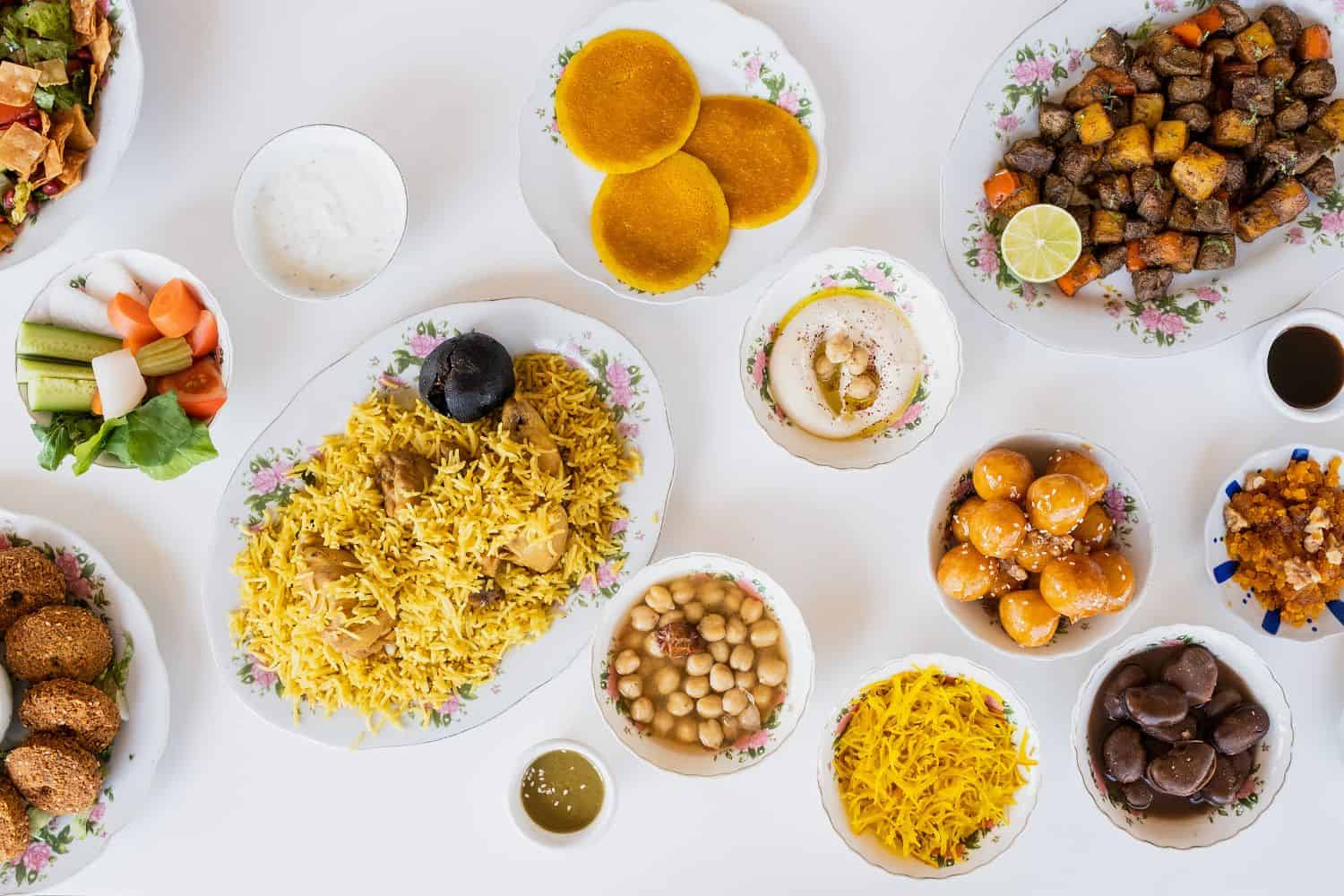
- Regional Variation: Food from United Arab Emirates diverse geography, comprising coastal areas, deserts, and mountains, has fostered a variety of regional cuisines. Each area integrates local ingredients and traditional cooking methods, contributing to a rich tapestry of flavors unique to each locality.
- Staple Foods: Staple foods in the UAE include rice, bread, and grains. Rice dishes, like “mandi” and “kabsa,” are popular, as are various types of bread, such as “khubz” and “rota.”
- Grilled Meats: Grilled meats, particularly lamb and chicken, are a common feature in Emirati cuisine. Dishes like “shawarma” and “kebabs” are beloved street food options.
- Spice Blends: Emirati cuisine relies on a mix of spices, including saffron, cardamom, cinnamon, and cloves. Spice blends like “baharat” are used to season meats and rice dishes.
- Seafood: Given its coastal location, the UAE has a strong tradition of seafood, with dishes like “sayadieh” (fish and rice) being popular along the coast.
- Traditional Dishes: UAE cuisine includes traditional dishes like “al harees” (a dish made from wheat and meat), “thareed” (a meat and vegetable stew served with bread), and “majboos” (a spiced rice dish).
- Dates and Dates Products: Dates hold cultural and culinary significance in the UAE. They are often served as a sweet treat or used in dishes like “rigag” (date-filled pancakes).
- Coffee and Tea Culture: Emirati hospitality often involves serving Arabic coffee, known as “gahwa,” along with dates. Traditional teas like “chai karak” and “sa’wah” are also popular.
- Sweets and Desserts: Emirati desserts often feature ingredients like dates, nuts, and rosewater. “Luqaimat” (fried dough balls drizzled with date syrup) and “asida” (a sweet, porridge-like dish) are common treats.
- Dining Etiquette: Emirati dining culture emphasizes communal eating. Dishes are typically shared, and it is customary to eat with the right hand. Food is often served on a large tray or platter, and diners gather around to enjoy the meal together.
- Global Influences: Due to its cosmopolitan nature, UAE cuisine has been influenced by international flavors, with a wide range of international restaurants and global ingredients available in the country.
- Modernization and Innovation: UAE’s rapidly modernizing cities like Dubai and Abu Dhabi have embraced international culinary trends and innovations, leading to the emergence of gourmet restaurants and fusion cuisine.
Book our services
Our services as a travel agency in United Arab Emirates ensure that your journey is not only enjoyable but also informative and hassle-free. United Arab Emirates’s cultural delights, historical marvels, and natural wonders await your exploration with RJ Travel LLC. Our United Arab Emirates Private Tours are designed to immerse you in the rich cultural heritage, historical significance, and breathtaking landscapes of this extraordinary nation.
Contact Us and our team will make sure to help you plan your trip to United Arab Emirates when it’s safe and ready for travel. Whether you’re interested in joining a pre-arranged United Arab Emirates small group tour or creating a custom itinerary, we are here to make your Emirati adventure an unforgettable reality.
More About United Arab Emirates
[the-post-grid id=”50442″ title=”United Arab Emirates Main page”]
Book Your Trip to United Arab Emirates Today!
Embark on an unforgettable journey and explore the allure of United Arab Emirates through our exclusive tours.

